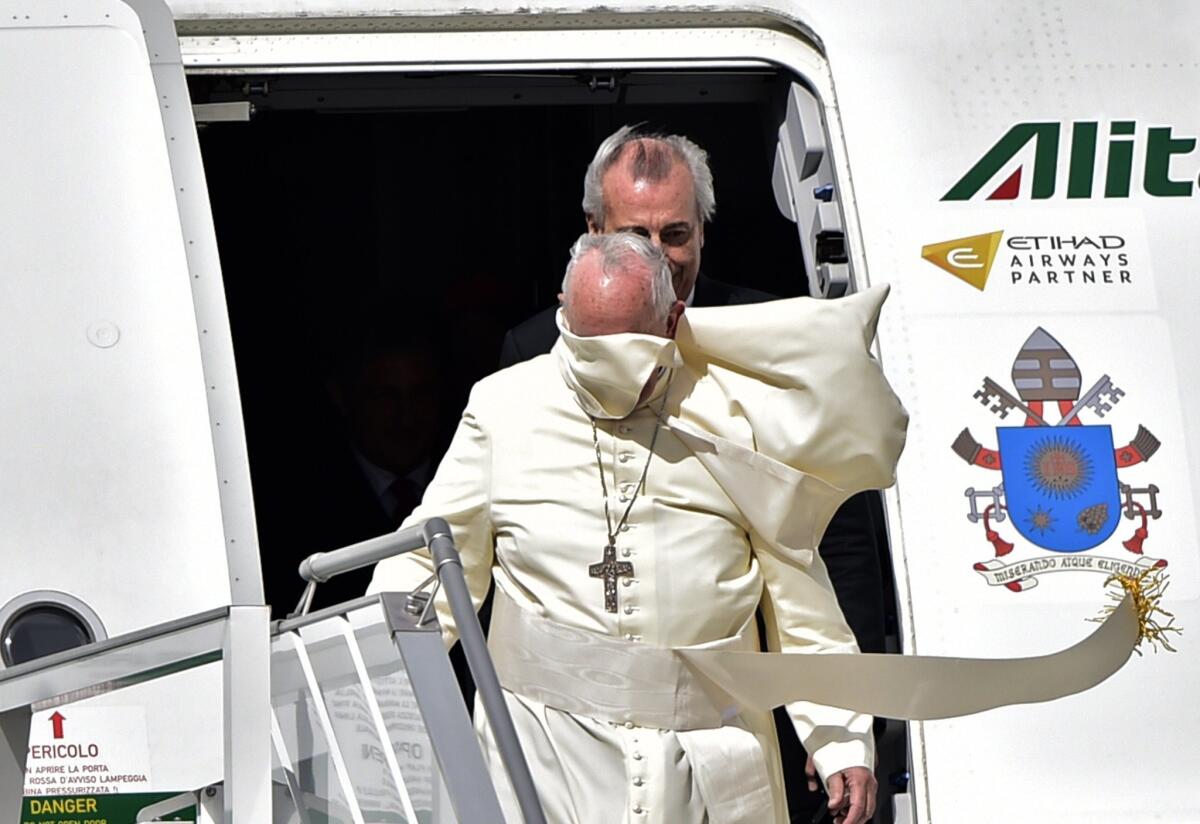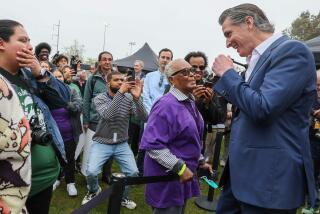Pope Francis lands in Ecuador, focusing on ‘concern for the most vulnerable’

As wind whips his garments, Pope Francis alights from an airplane upon landing at the Mariscal Sucre International Airport in Quito, Ecuador, on Sunday.
- Share via
Reporting from Quito, Ecuador — Pope Francis launched the first of two summertime trips to the Americas on Sunday, arriving in Ecuador on a mission to reach and energize some of the hemisphere’s poorest, most marginalized -- and most Catholic -- populations.
Francis, the first pope born in the Americas, intends for his now-familiar theme of expanding a “church for the poor” to be made real on his native continent.
“I thank God for having allowed me to return to Latin America to be here with you today,” Francis said after stepping off the Alitalia jet that brought him from Rome, becoming the first pope in 30 years to set foot in the dramatically beautiful but politically troubled Andean country of Ecuador.
He said he hoped the gospel would lead the way to “meeting contemporary challenges,” while respecting differences, dialogue and broad participation, so that growth and progress can benefit “everyone, with particular concern for the most vulnerable of our brothers and sisters.”
Departing from his prepared remarks, he said that concern for the most vulnerable “is a debt that all of Latin America has.”
Francis was greeted with a hug on the heavily guarded tarmac by Ecuador’s leftist President Rafael Correa. A gust of wind knocked the white cap from his head as he walked off the plane.
The pope noted that Ecuador was home to the place on Earth “closest to the sun,” the peak of the Chimborazo volcano.
Francis sounded tired as he spoke, his voice somewhat strained.
In addition to Ecuador, he will travel to Bolivia and Paraguay over the next eight days.
By choosing impoverished and geopolitically insignificant countries, Francis drives home his belief in preaching “from the periphery,” as he and others have put it.
Similarly, he elected visits to Albania and Bosnia in Europe before larger, wealthier countries such as France and Germany, noted Austen Ivereigh, an expert on the church and author of a biography, “The Great Reformer: Francis and the Making of a Radical Pope.”
“The point he wants to make ... is his conviction that often those on the margins are the most receptive to the church, and he wants to give voice to those on the margins,” Ivereigh, founder of the Catholic Voices website, said in a telephone interview from near Oxford.
It is an attitude Francis solidified when he cleared the way earlier this year for the beatification of slain archbishop Oscar Romero, of El Salvador, who was revered in much of Latin America and widely seen as a champion for the poor and downtrodden.
Expectations are high for this papal pilgrimage, with predictions that millions will turn out to see Francis, who is extremely popular, even among many non-Catholics.
The Argentine-born pontiff will also be in his element, speaking his native Spanish and evangelizing among people he knows well. As a Jesuit priest in Buenos Aires, he often preached in that city’s shanty towns, which were heavily populated by Paraguayan, Ecuadoran and Bolivian immigrants.
As he did in his first trip to Latin America in Brazil in 2013, the pope also hopes to revitalize a church that has lost ground to Protestant groups, secularism and indigenous movements.
“The big question is: Will the wild popularity of Pope Francis translate into numbers for the church?” Andrew Chesnut, a church studies professor at Virginia Commonwealth University, said in a recent broadcast of Latin Pulse. “If it doesn’t, the Catholic Church will continue to be in trouble.”
That question is less of an issue in the countries of this voyage, three of the most Catholic countries in South America, according to a recent survey by the Pew Research Center. In Paraguay, a full 89% of residents identify themselves as Roman Catholic, and attendance at Mass is particularly high.
The pope is also expected to make a special appeal to the indigenous, sprinkling his sermons with native languages such as Guarani, Aymara and Quechua -- in part to counter a movement in South America to recover pre-Columbian concepts, but that has sometimes taken on anti-colonial, and anti-clerical, tones, Ivereigh said.
Whether he gets mired in national politics or uses the themes he shares with leftist leaders to navigate the minefields will test Francis’ considerable diplomatic skills. He would find common cause, for example, on climate change and other environmental ills that he blames in part on Western consumerism, as outlined in the pope’s recent historic encyclical on the subject.
In Bolivia, church-state relations were soured after the election in 2005 of leftist President Evo Morales and his push to change the constitution, declaring Bolivia a secular state.
“The church had been a privileged institution and Bolivia opted to become a lay state,” said Father Steve Judd, an American missionary priest in the Bolivian city of Cochabamba. “That caused some mutual suspicion, where the church would go.”
But Morales quickly embraced Francis and even traveled to Brazil and to Rome to meet with him.
“Some people consider the pope coming to the country as perhaps a favor or a way to improve relations with the current government or because of the friendship [Morales] has with the pope,” said Jose Luis Aguirre, spokesman for the papal trip’s organizing committee in La Paz, the Bolivian capital.
Francis plans to spend just four hours in La Paz and its sprawling neighbor El Alto, because of their altitude of nearly 12,000 feet -- potentially problematic for a pope with just one lung. He will move then to Santa Cruz, in Bolivia’s lowlands.
In Quito, meanwhile, in the days leading up to the pope’s arrival, thousands of anti-government demonstrators have taken to the streets to protest tax hikes, turning raucous at the end of last week and inviting an angry rebuke from Correa on Saturday. He accused his foes of attempting to politicize the pope’s visit.
“Enough of so much violence, so much cowardice,” Correa said in a weekly, four-hour television address. “How sad we have to talk about this before the pope’s arrival.”
In response, opposition leaders critcized Correa’s government for cherry-picking papal statements to support its own issues, such as the need for redistribution of wealth, and plastering them on fences across the capital.
The pope has scheduled two days of events in each country, including meetings with local bishops, officials, jailed inmates and people from slums.
In September, Francis heads for Cuba and the United States, where he will meet with President Obama, become the first pope to address a joint session of the U.S. Congress and elevate to sainthood Junipero Serra, the controversial Franciscan friar who founded California’s missions.
Special correspondent Jaramillo Viteri reported Bfrom Quito and staff writer Wilkinson from Mexico City. Special correspondent David Agren in Mexico City contributed to this report.
Follow @TracyKWilkinson on Twitter for more news from Latin America.
More to Read
Sign up for Essential California
The most important California stories and recommendations in your inbox every morning.
You may occasionally receive promotional content from the Los Angeles Times.











